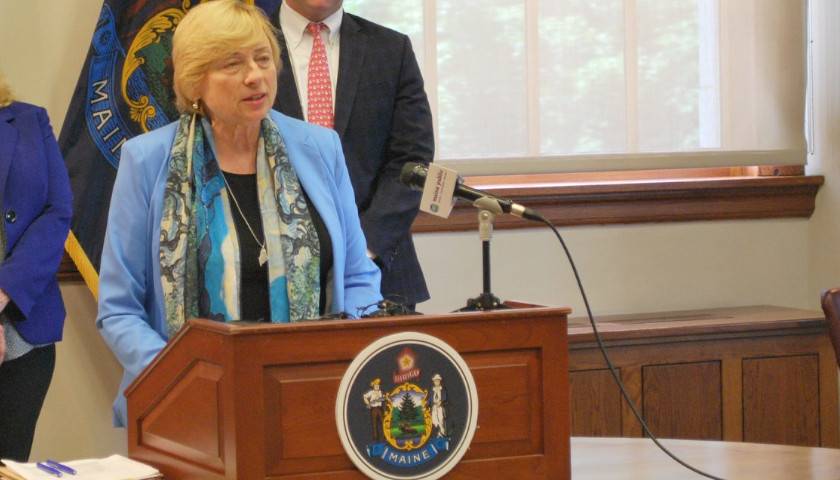The OB/GYN tapped by Maine Gov. Janet Mills (D) to champion her bill that would allow abortions up until birth has been found to have authorized the 24-week abortion of a woman who later died in Albuquerque from complications due to the procedure.
Dr. Shannon Carr was named in the wrongful death lawsuit filed against her employer, Southwestern Women’s Options (SWO), the Maine Wire reported Friday.
According to the report, Bristol-based Carr, who served as an expert witness in favor of Mills’ (pictured above) full-term abortion bill, was deposed for her role in authorizing a late-term abortion in 2017 for Keisha Marie Atkins, a 23-year-old New Mexico woman who, an autopsy report revealed, died February 4 of that year after transport from SWO to the University of New Mexico (UNM) Hospital.
Late-term abortionist Dr. Curtis Boyd performed the four-day abortion procedure on Atkins, who was at least six months pregnant at the time of the abortion.
As Breitbart News reported at the time, the autopsy report from the UNM Health Sciences Center indicated the pathologists cited the cause of Atkins’s death as “pulmonary thromboembolism due to pregnancy,” or blood clot in the lungs.
The summary of their findings, however, detailed what occurred during the abortion procedure:
Ms. Atkins was at a clinic preparing for the final portion of a termination of pregnancy. She presented to the clinic with complaints of cramping pain as expected and was resting preparing for labor. While at the clinic, she noted that she was feeling short of breath, and her oxygen saturation dropped below her baseline … Due to the concerning symptoms, she transferred to University of New Mexico Hospitals, where she continued to have cramping abdominal pain, elevated heart rate and difficulty maintaining normal blood oxygen levels despite supplemental oxygen therapy.
…
Due to rapid decompensation in her clinical status … and the concern for a clinical infection, she was taken emergently to the operating room to complete the abortion procedure. During the operation, she sustained a cardiac arrest. Extensive resuscitation efforts were ultimately unsuccessful.
Troy Newman, president of abortion industry watchdog organization Operation Rescue, said in a statement at the time:
UNM is a biased promoter of abortion that is attempting to shift blame onto Atkins’ pregnancy, instead of the abortion, where the blame rightfully belongs. Keisha Atkins and her family deserve the truth, not a cover-up. But with UNM and SWO, covering up their misdeeds has become standard operating procedure.
According to the Maine Wire, Carr approved of Atkins’ abortion following only a 20-minute consultation, after which “abortionists injected Atkins’ womb with medication that killed her unborn child and she was sent home with the deceased child still inside her, where it would remain until she died just after midnight on Feb. 4, 2017.”
A report obtained by the news outlet justified the medical reason for Atkins’ late-term abortion.
“Based on my evaluation of the patient and taking into account her age and her family and financial situation, it is my professional opinion that being forced to continue the pregnancy will cause substantial and irreversible harm to her physical health, her mental health, her family health, her safety and well-being,” the signed report stated.
Atkins’ family ultimately sued SWO, UNM Health Group, and several doctors involved in the abortion.
Carr, an employee of SWO, was named individually in the suit.
The parties eventually settled in 2022 for more than $1.26 million, according to a report at the Albuquerque Journal.
Mills’ LD 1619 would “change the standard for when an abortion may be performed after viability to when a licensed physician determines that it is necessary instead of when it is necessary to preserve the life or health of the mother,” the summary of the bill states.
In the medical animation video below, former abortionist Dr. Anthony Levatino, now a pro-life advocate, explains a late-term abortion procedure:
Jamie Jeffries, the executive director of Abortion on Trial, appeared as a guest Monday on Maine Wire TV to talk with Editor-in-Chief Steve Robinson about what legalized late-term abortion up until birth will mean for the state of Maine.
Robinson noted the bill is “backed by almost every Democrat in the legislature and the governor” and “would expand abortions, expand legal abortion up until, really, the point of birth.”
He added that while 65-70 people turned out to testify in favor of the bill, including Carr, over 1,500 people came out to oppose the legislation.
Governor Mills' radical abortion bill will allow medical "experts" to make judgment calls on if a late-term abortion will proceed.
Jamie Jeffries from @AbortionTrials joins us tonight at 8:30 PM to explain how those judgment calls can get women killed. pic.twitter.com/w80UReXMNn
— The Maine Wire (@TheMaineWire) May 8, 2023
Jeffries, whose organization provides free legal services to women injured during abortions, pointed out the traumatic nature of late-term abortions for women.
“The result is a dead baby, and it takes two to four days outpatient,” she described. “And so, women will go back and forth from the clinic to home or more often a hotel because a lot of times women come from out of state for these late term procedures, so they’re not even at home. They’re in a hotel and taking Ubers from the hotel back to the clinic as they have a dead baby halfway out. So, it’s really, really dangerous and traumatic but it’s very, very standard procedure.”
In April, Robinson wrote that Mills “has thrown the full weight of her office behind the effort to make Maine’s abortion laws the most radical in the United States.”
“In addition to being far more radical than any other state’s abortion rules, the push to legalize gruesome full-term abortions has been replete with misleading statements and misrepresentations,” he continued, noting especially that Mills repeatedly said during her re-election campaign that she would not pursue any changes to Maine’s current abortion laws.
“The bill has been advertised as protecting ‘privacy,’” Robinson also observed. “But there are no privacy provisions in the bill. The only thing that might be construed as a privacy provision is a requirement that names be withheld from a report that the bill itself calls for.”
“Saying this bill is about ‘privacy’ is detached from reality,” he asserted. “But what would you expect from the people who consider ending the life of a viable pre-born human ‘reproductive care.’”
– – –
Susan Berry, PhD is national education editor at The Star News Network. Email tips to [email protected]
Photo “Janet Mills” by Janet Mills.




